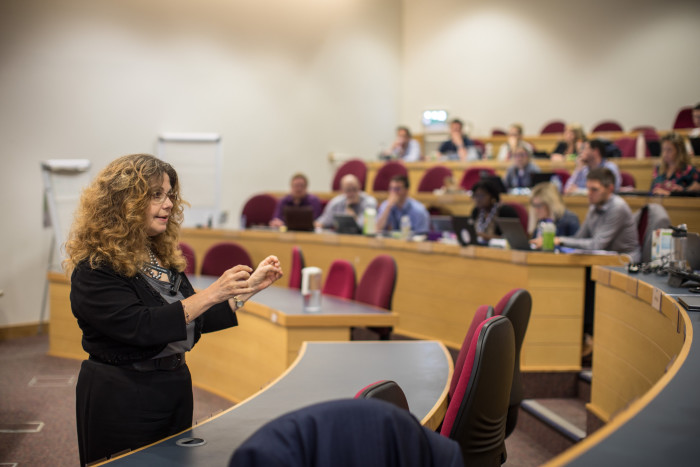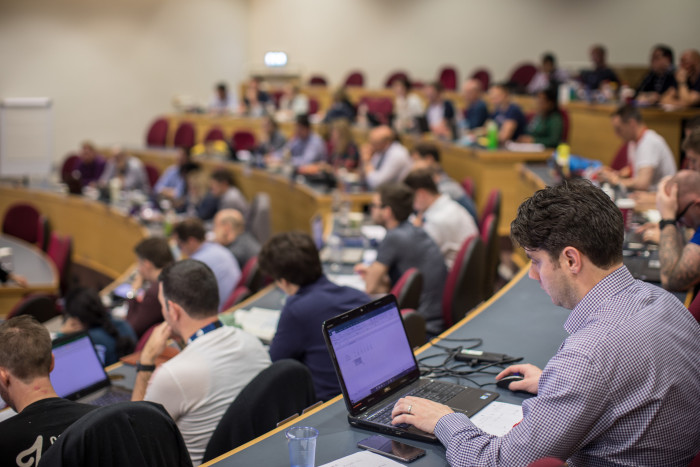Can demand for executive MBAs ride out recession?

Roula Khalaf, Editor of the FT, selects her favourite stories in this weekly newsletter.
Anh Nguyen applied to the executive MBA course at Chicago Booth School of Business before the world was upended by Covid-19. She even flew to the US from her London home in early 2020 to see the campus before the pandemic rendered travel impossible.
She completed much of the course online and graduated in June this year, as the energy crisis created further uncertainty for jobs and career prospects. But Nguyen, who advises Fortune 500 companies on financial risk strategy in her role as a director at Chatham Financial, believes she judged the timing well. The turbulent period gave her insights into the thinking of board directors, which helped in her current role, and also the skills to pursue her next goal of setting up her own venture.
Nguyen is now in the process of launching a blockchain business for the arts sector with six classmates from Booth, spread between Brazil, Hungary and the UK, helping cultural organisations to engage with their audiences and generate revenue using non-fungible tokens (NFTs).
“As we go into challenging times, [the EMBA] has helped me think about how to grow in a very different way,” she says. “Certainly, it is challenging to think about fundraising and other aspects of launching a business, but the EMBA has given me a fresh perspective on what the landscape looks like.”
FT Executive MBA Ranking 2022

Find out which schools are in our ranking of EMBA degrees. Also learn how the table was compiled and read the rest of our coverage at ft.com/emba.
Demand for EMBAs, and full-time MBAs, jumped during the pandemic as the cost of taking a career break, or committing spare time to study that could improve career prospects, reduced. As the anxiety of lockdowns began to be replaced with concern about recession, this drive to gain skills that can help in uncertain times remained strong.
The Graduate Management Admission Council (GMAC), which administers the standardised test taken by business school applicants, reports that the uptick in people taking the exam in 2021 has continued into 2022.
“Growing fear of recession, the state of unemployment and desire for wage growth ahead of inflation are all relevant factors,” says Joy Jones, the GMAC’s new CEO.
This is reflected in rising applications to schools. Kai Stenzel, chief market officer for the Mannheim Business School in Germany, says expressions of interest in its EMBA have increased 20 per cent over the past three years.
“Currently, in Germany, there are about 2mn vacant positions, but fortysomethings, the target EMBA group, are preparing now for a harder labour market in a few years’ time,” he says.
However, Stenzel adds that the situation is complicated by the current need for people to work as the economy emerges from lockdown, making it harder for EMBA applicants to get the time off to study part-time.
“At the beginning of 2022, we had a lot of people apply but who did not then take up the course because their company was saying we have too much work to do,” Stenzel says. “People in the target EMBA market also tend to be in a very good position at the moment to negotiate with their employers for better roles, which also reduces the attraction of spending money on a management degree.”
The rising cost of living is also a factor dampening demand, according to Xavier Duran, MBA director at Alliance Manchester Business School. “EMBAs are expensive, and the people taking them usually have families to provide for and big bills coming in every month. At the moment, it is also difficult to budget for the cost of a postgraduate degree if you do not know how much your energy bill will be in a few months’ time.”
Digital conference: Spotlight on the Executive MBA

Join global education editor Andrew Jack and business school experts around the world for a free online event on Wednesday October 19, focusing on career impact, insights into the 2022 ranking, and themes from managing disruption to ESG. Register here
However, Duran adds that the UK school’s EMBA numbers are holding up “quite nicely”, partly because of people who deferred studying during the pandemic lockdowns now taking up places on the programme.
Kelley Martin Blanco, senior associate dean for EMBA and global programmes at Columbia Business School in New York, says that the tight jobs market can actually give executives who wish to study part-time the leverage to negotiate time off to do so.
This has helped maintain strong demand for the 60 or so places on the EMBA-Global, jointly run by Columbia and London Business School, says Martin Blanco. “Because of the buoyancy in the jobs market, people can get more flexibility to take time off to be in class or work remotely. That is a great thing for EMBA programmes generally.”
At the same time, there is a flight to quality under way, with students becoming more picky about the courses they apply to, which means some smaller schools are finding it harder to attract EMBA students.
The University of Missouri’s Trulaske College of Business has put its two-year executive MBA programme on hiatus for a year after demand dipped to a level the school felt did not justify running it, according to Christopher Robert, interim dean and associate professor of management.
“Our full-time MBA is going gangbusters,” he says. “[The EMBA] is just a very different market. The traditional EMBA student has been in a good career, but is looking for upskilling and networking to make a career move. However, in the current strong jobs market, those careers have been extremely available to people.”
Comments